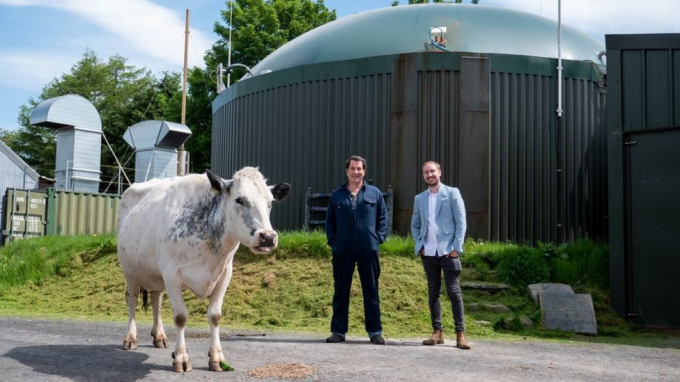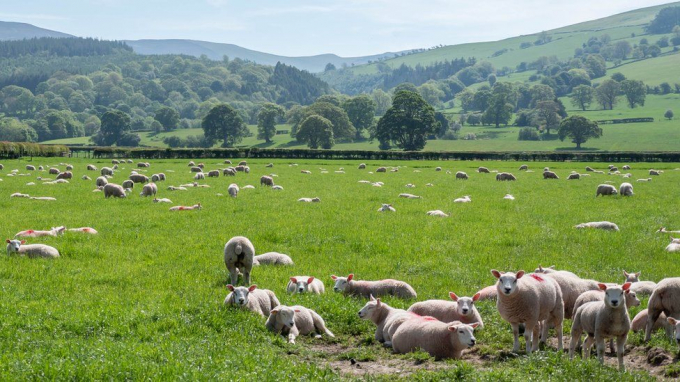November 28, 2025 | 03:44 GMT +7
November 28, 2025 | 03:44 GMT +7
Hotline: 0913.378.918
November 28, 2025 | 03:44 GMT +7
Hotline: 0913.378.918

Crypto-mining farmer Philip Hughes (centre) and Josh Riddett, with one of their bovine colleagues
In a green shipping container next to a large domed tank, a very different kind of farm also thrives in this idyllic landscape - a cryptocurrency farm.
Philip Hughes's family have farmed the land for generations - but now he is turning his hand to mining, using powerful computers powered by renewable energy to generate new cryptocurrency.
And that energy is derived, as Philip puts it, from "cow muck".
A big six-cylinder engine running at 500rpm turns methane given off by decomposing cow manure into electricity.
The process is called anaerobic digestion.
In the absence of oxygen, microbes break down the manure and produce methane, which can be combusted to produce heat and electricity, instead of entering the atmosphere where it would act as a powerful greenhouse gas.
What's left over can be used as fertiliser.
About two-thirds of the electricity generated by the anaerobic digester helps power the farm and the farm's caravan park - but the remainder powers mining rigs, specialist computers about the size of a suitcase.
They are working on complex computations that serve to verify transactions and in return are rewarded with new cryptocurrency - a process that can consume large amounts of energy.

Some more traditional sources of farm income
Presently, they are mining Ethereum.
The income has been good but "it does very much depend on what day you ask that question", Philip says, with a nod to the notorious volatility of this digital product.
The value of Ethereum has fallen from over $4,000 (£2,800) in May to about $2,400 at the time of writing.
Philip has also started leasing out his renewable energy.
The rigs powered by the digester are a mixture of those he owns and others belonging to third parties.
At a cost of about £18,000, each rig is stuffed with "lots of very powerful computer-graphics cards", according to supplier Josh Riddett, who runs Easy Crypto Hunter, in Manchester.
And while the energy consumption of Ethereum mining is high, it is significantly less than mining Bitcoin and may yet be reduced further.
Josh has been pitching cryptocurrency mining to small-scale renewable electricity generators for some time - he says his equipment is in 42 sites covering solar, hydro and wind-powered generators in addition to anaerobic digestion.
But some small-scale hydro projects are wary because they worry about the environmental impact of the cryptocurrencies.
And others doubt cryptocurrencies will be valuable for long enough or consistently enough to repay the considerable capital investment hydropower requires.
Out of the British Hydropower Association's 290 members, the association's CEO Simon Hamlyn, knows of just two who are trying out crypto mining.
One has purchased a number of rigs to install at sites in Northern Ireland.
But the other fell victim to a heist, when masked thieves crossed fields to break into the powerhouse and steal the rigs.
Previously, the main mechanism for developing renewable-energy schemes was the feed-in-tariff, which paid renewable generators for the electricity they fed into the grid.
The tariff started in 2011 and a boom in renewables followed - but the amount it pays has declined and it closed to new generators in 2019.

An e-waste problem in the making?
"We're not going to be able to move to green energy unless the government revitalises the subsidy, or we start looking at alternatives," Josh says.
But renewable energy used to mine cryptocurrency cannot be used for other purposes, such as powering electric cars or heating homes.
If cryptocurrency is as socially valuable as any of those things, this might not matter - but for critics such as financial economist Alex de Vries, who writes the Digiconomist blog, it is a waste of green energy.
"The utility these systems can have is inherently extremely limited," he says.
"If you look at Bitcoin, it can only process seven transactions per second at most - that's its maximum capacity.
"You have to consider that a payments provider like Visa can do 65,000 transactions per second if needed."
The decline of heavy industry has left some parts of the US with a surplus of hydroelectric power and the resulting cheap electricity has attracted cryptocurrency miners.
But communities that have experienced a "gold rush" of crypto miners have found it a mixed blessing, pushing up electricity prices.
And some, such as Plattsburg, have temporarily banned crypto mining.
Alex worries also about the limited lifespan of mining equipment, which he says can rapidly become obsolete, creating an e-waste problem.
And rather than switching to renewables, many say it would be better to make cryptocurrencies more efficient - or stop using them altogether.
In the UK, the Anaerobic Digestion and Bioresources Association says only a "small handful of plants" are exploring crypto mining.
And Philip is very aware his cryptocurrency business is based upon producing an asset whose value can change dramatically, sometimes in response to a single remark by Elon Musk or Donald Trump.
If the market collapses, he says, he will put the computing power of the rigs to other uses.
But some seem more speculative than others, such as setting the boxes of graphic cards to work rendering computer animation for film-makers such as Disney.
His venture into crypto has sparked interest, though.
Other farmers interested in the project have called him, Philip says.
And it is "a lot easier to run a computer, than a herd of cows or a flock of sheep".
(BBC)

(VAN) A new study reveals how the simultaneous effects of ocean acidification, salinity and loss of oxygen are making the world more fragile.

(VAN) Hopes are growing that the creation of the first 3D turkey gut model could be a turning point in the battle against the virulent blackhead disease.

(VAN) Tyson, America’s biggest meat supplier, plans to shutter one of its largest beef processing plants as the industry continues to struggle with low cattle supplies and political pressure from Washington.

(VAN) New FAO study shows how digital solutions are empowering farmers and fishers to prevent losses and build resilient agrifood systems.

(VAN) Brazil's COP30 presidency pushed through a compromise climate deal on Saturday that would boost finance for poor nations coping with global warming but that omitted any mention of the fossil fuels driving it.

(VAN) Poultry farmers in the UK have been warned that they could face one of the worst winters yet for bird flu.

(VAN) Prices of main-crop paddy have risen sharply, with jasmine rice hitting 16,100 baht per tonne — the highest level in years.